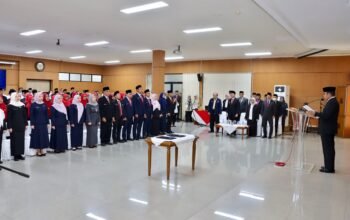Rasi Yugafiati : a doctoral student at the Faculty of Language Education UNNES.
Literacy is not merely a skill but a fundamental pillar of national development.
A society with high literacy rates fosters critical thinking, economic progress, and social cohesion.
However, Indonesia continues to struggle with low literacy levels, as evidenced by various international assessments such as PISA.
The root of the problem lies not only in the education system but also in the broader socio-cultural and policy frameworks that shape literacy development.
Without systemic reforms that address these underlying issues, Indonesia risks falling behind in the global knowledge economy.
A major flaw in Indonesia’s approach to literacy is its overemphasis on rote learning rather than comprehension and critical thinking. Many Indonesian schools prioritize memorization-based assessments over analytical skills, limiting students’ ability to engage with texts critically.

Linda Darling-Hammond (2017) argues that an effective literacy system must integrate experiential learning and professional teacher development. Countries like Finland, which emphasize teacher autonomy and inquiry-based learning, have successfully cultivated a strong reading culture. Indonesia must move beyond test-oriented education and embrace pedagogical reforms that encourage deeper engagement with texts.
Another critical issue is the lack of access to quality reading materials, particularly in rural areas. While digital literacy initiatives have gained traction, they often remain inaccessible due to technological and infrastructural limitations.
Niemi and Lavonen (2020) highlight how Finland’s decentralized education model enables local governments to tailor literacy programs to community needs. Indonesia should adopt a similar approach by decentralizing literacy initiatives and ensuring equitable distribution of educational resources across diverse regions. Simply increasing the number of libraries or digital platforms is insufficient; policies must address affordability, accessibility, and the quality of available content.
Furthermore, the role of mass media in literacy development remains underutilized. Media outlets in Indonesia predominantly focus on entertainment rather than educational content. Alan Waters (2009) argues that media-driven literacy programs must integrate innovative strategies to make learning more engaging.

Countries such as South Korea have successfully incorporated media into literacy campaigns, demonstrating how television, social media, and online platforms can be leveraged for educational purposes. The Indonesian government and media stakeholders must collaborate to create content that promotes literacy in an appealing and effective manner.
Ultimately, literacy development in Indonesia requires a paradigm shift that goes beyond conventional educational reforms.
It demands a multi-sectoral approach that involves educators, policymakers, media professionals, and local communities. A strong literacy culture is not built overnight.
It requires sustained efforts, systemic changes, and a commitment to fostering a society that values knowledge and lifelong learning. Without such reforms, Indonesia’s literacy crisis will continue to hinder its social and economic progress.














